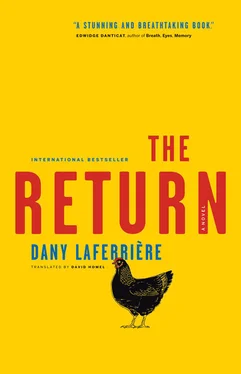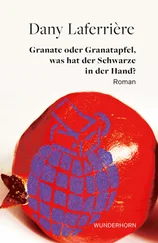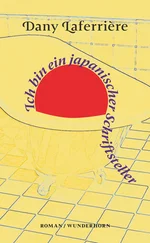I don’t know why
this morning I have such a desire to see
my friend Rodney Saint-Éloi at 554 Bourgeoys Street.
Appreciate the irony of this street name
for a modest left-wing publishing house
in the working-class neighborhood of Pointe-Saint-Charles.
Waiting for me at the top of the steep staircase
Saint-Éloi and his wide smile
with a salmon cooking over low heat
on a bed of thin slices
of onion, tomato, lemon and red pepper.
Hanging on the wall the luminous poems
of Jacques Roumain, the young man who sang
so sadly of the fall of Madrid
with a feminine elegance
that reminds us of Lorca.
Here we are sitting,
Saint-Éloi and me.
Face to face.
Both of us from Haiti.
Him, scarcely five years ago.
Me, nearly thirty-five years back.
Thirty endless winters separate us.
That’s the hard road he’ll have to take.
He arrives just as
I’m leaving.
He’s starting
as I finish.
Already the next generation.
So much time has passed.
One day, before him
will stand another man
who will resemble him
like a younger brother.
And he will feel
the way I do today.
The red sofa where this tall dark-haired girl is sleeping so soundly. The night was eventful. Several empty wine bottles, a make-up case, a black-and-yellow bra. The remains of a meal still strewn across the table. Spices in small bottles. Towels on the bathroom floor. Dirty dishes cluttering the sink. I step onto the little balcony that overlooks the grassless yard. The life of an intellectual in a working-class district.
Tiga paintings on the walls. A photo of the poet Davertige (light-colored suit, black bowler hat, big smile) in the vestibule. His smile beneath the pain of a dandy at rest reminds me of my father. Scattered here and there, the most recent books published by Mémoire d’encrier: between the sheets, under the bed, on the fridge, in the bathroom, even on the range where a Creole-style chicken is simmering.
Exile combined with cold
and loneliness.
One year, in those conditions, counts as two.
My bones have dried out from inside.
Our eyes tired from seeing the same scene.
Our ears weary from hearing the same music.
We are disappointed at having become
what we have become.
And we understand nothing
of this strange transformation
that has occurred without our knowledge.
Exile in time is more pitiless
than exile in space.
I miss
my childhood more intensely
than my country.
I am surrounded by books.
I am falling asleep on my feet.
In my dream I see
my father’s suitcase
tumbling through space.
And his judging eyes
turning slowly in my direction.
One last look out the airplane window.
This cold white city
where I’ve known my strongest passions.
Now ice lives inside me
almost as much as fire.
From the hotel balcony
I watch Port-au-Prince
on the brink of exploding
by the turquoise sea.
In the distance, the island of Gonâve
like a lizard in the sun.
That bird that crosses
my field of vision
so quickly — barely eight seconds.
Here it comes again.
The same one?
As if that mattered.
The young man sweeping
the hotel courtyard so energetically,
so different from the old man yesterday morning,
seems to have his mind elsewhere.
Sweeping, because it lets you dream,
is a subversive activity.
This morning it’s not Césaire
I feel like reading
but Lanza del Vasto
who was able to be satisfied
with a cool glass of water.
I need a man of serenity
not some guy seething with anger.
I don’t want to think.
Just see, hear and feel.
Note it all down before I lose my head,
drunk on this explosion of tropical
colors, smells and tastes.
I haven’t been part of a landscape like this
for so long.
In the slum called Jalousie (because of how close the luxury villas are, which tells us something about the sense of humor you need to live there) the little girl woke up before the others to go fetch water. I follow her with the binoculars the hotel owner lent me. She climbs the mountainside like a young goat, with a plastic bucket on her head and another one in her right hand. I lose sight of her as I scan the neighborhood waking up. There she is again. Her wet dress flat against her thin young body. The guy with the mustache and the tie sipping coffee on his gallery watches her too.
Let us carefully observe the scene.
Close-up on the face of the mustached guy.
His intense concentration
on the dance of the girl’s hips.
The slightest movement of that wonderfully supple body
is absorbed by his greedy little eyes.
The nose awakens to the scent.
The cat leaps.
Claws buried in the back of her neck.
The girl’s arched back.
Not even a cry.
Everything happened
in his head
between two sips of coffee.
I sit on the veranda
and gently place the binoculars
at the foot of the chair.
Warmed by the sun
already strong at six in the morning
I soon slip into sleep
both light and deep.
Almost asphyxiated
by the smell of warm blood
that goes to my head.
The butcher is cutting
beneath my window.
The machete whistles.
A red rainbow in the air.
The cut throat of a young goat.
The animal seems to smile in its pain.
Its eyes, soft green, find mine.
What is there beyond such sweetness?
Its neck breaks
like a cane field bent low by the breeze.
Behind me the owner
smiles with her eyes.
Her long experience
of pain
should be taught
in these days
when we learn everything
except how to face
the storms of life.
I step into the street
to bathe
in the human river
where more than one swimmer drowns
each day.
The crowd chews over the naïve fresh meat
of all those exiles who hope to recover
the years of absence in their energy.
I’m neither the first nor the last.
On the sidewalks.
In the parks.
In the middle of the street.
Everyone buying.
Everyone selling.
They try to trick poverty
through constant movement.
My eyes take in the scene.
Peasants listening to their transistors.
Hoodlums on motorbikes.
Girls working the street by the hotel.
The music of flies
above green mud.
Two bureaucrats slowly crossing the park.
Zoom in on that girl laughing on the sidewalk across the street with a cell phone jammed in her ear. A car stops next to her. Strident honking — as if the driver’s hand were stuck on the horn. The girl pretends not to hear. The driver goes on his way. Laughter from the fruit vendors who witness the scene.
Primary colors.
Naïve motifs.
Childlike vibrations.
No space left empty.
Everything full to the brim.
The first tear will cause
this river of pain in which
people drown, laughing, to
overflow.
Proud carriage.
Empty belly.
The moral elegance of the girl
who walks past me
for the third time in five minutes.
Without a look in my direction.
Attentive to my slightest move.
Have you ever considered a city
of more than two million people
half of whom are literally starving to death?
Читать дальше












